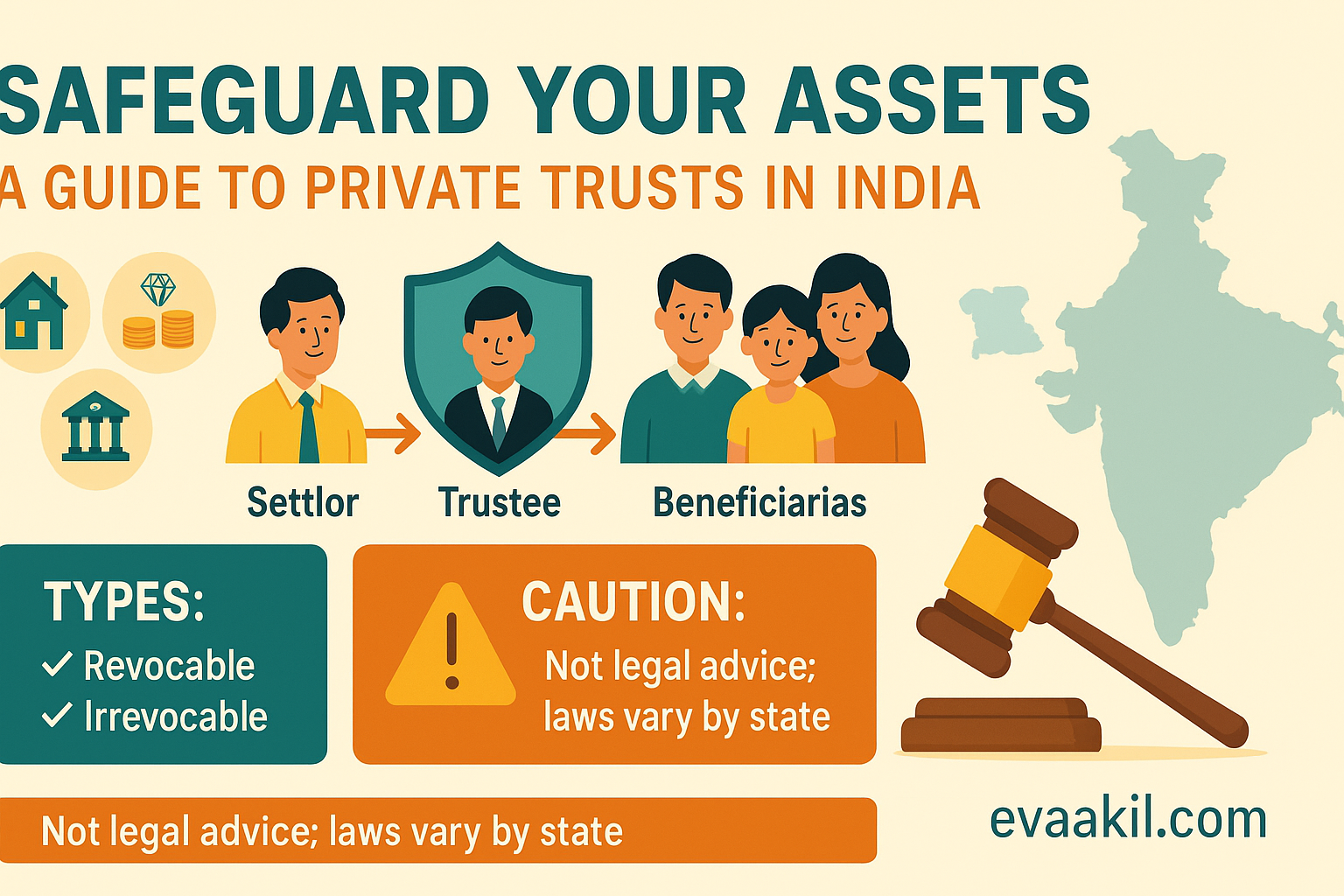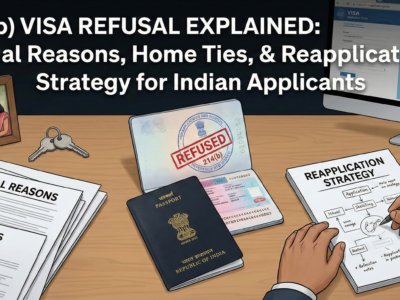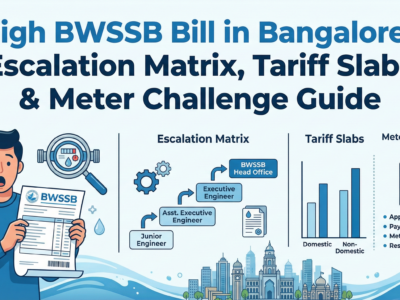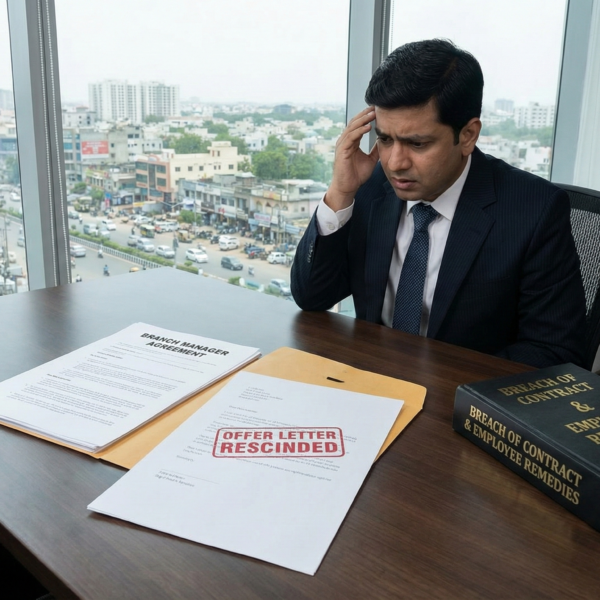Planning your marriage in India is an exciting time, but it’s also wise to consider how to protect your hard-earned assets. With a complex legal landscape, understanding the best way to safeguard your future can be daunting. This comprehensive guide explores the most effective strategy available: creating a private family trust.
We’ll walk you through everything you need to know—from choosing the right structure (Irrevocable vs. Revocable) and appointing trustees, to the step-by-step process of drafting a Trust Deed, navigating tax implications, and understanding the risks involved. Discover why a trust is a far superior option to prenuptial agreements or a HUF for pre-marital asset protection in India.
Secure Your Future: A Guide to Pre-Marital Asset Protection in India
Getting married is a significant milestone. In today's world, it's equally important to be prudent. Discover how a Private Family Trust can be your most powerful tool for safeguarding your hard-earned assets.
What is a Private Family Trust?
A Private Family Trust is a legal arrangement established under the Indian Trusts Act, 1882. It's not a company, but a fiduciary relationship where you (the 'Settlor') transfer your assets to a 'Trustee' to manage for the benefit of your loved ones (the 'Beneficiaries'). This creates a legal "ring-fence" around your assets, separating them from your personal liabilities, including potential claims in a matrimonial dispute.
The essence of a trust is the transfer of legal ownership. Once you settle your assets into a properly structured trust, they are no longer legally yours. They belong to the trust, managed by trustees who are legally bound by an "obligation" to act in the best interests of the beneficiaries. This fundamental separation, born from the "confidence" you repose in the trustees, is what gives the trust its protective power. A court will scrutinize whether this obligation has been genuinely fulfilled to determine the trust's validity.
The Anatomy of a Family Trust
The Settlor
The creator of the trust and the original owner of the assets.
The Trustee(s)
The legal owner and manager of the assets, bound by a fiduciary duty.
The Beneficiary(ies)
The individuals for whose benefit the trust is managed.
Choosing Your Shield: A Strategic Comparison
Not all asset protection strategies are created equal. Here’s how a Trust stacks up against other options.
| Strategy | Asset Protection | Settlor's Control | Legal Enforceability | Key Vulnerability |
|---|---|---|---|---|
| Irrevocable Discretionary Trust | High | Low (Indirect) | High | "Sham Trust" Challenge |
| Hindu Undivided Family (HUF) | Medium-Low | High (as Karta) | High | Right of Partition |
| Prenuptial Agreement | Very Low | N/A | Very Low | Unenforceability |
Designing Your Fortress: The Optimal Trust Structure
Irrevocable vs. Revocable
The most critical choice. An Irrevocable Trust is a permanent relinquishment of assets, offering true protection. A Revocable Trust can be changed, offering flexibility but zero protection from claims, as a court can compel you to revoke it. For asset protection, this choice is non-negotiable.
Discretionary vs. Specific
A Discretionary Trust gives trustees absolute power to decide who gets what, and when. This ambiguity is a strength, as no beneficiary has a fixed, enforceable right to an asset. A Specific Trust defines shares, creating a vulnerable, attachable "property right" for each beneficiary.
The Gold Standard: An Irrevocable Discretionary Trust is the most robust structure for pre-marital asset protection in India.
Appointing Your Trustees: The Guardians of Your Assets
The choice of trustees is not an administrative detail; it's a critical strategic decision. A court will scrutinize their independence to determine if the trust is genuine or merely your 'alter ego'. While you and your parents can legally be trustees, this creates a significant risk.
Highly Recommended: Hybrid Board
Appoint a mix of family members and at least one independent professional (a lawyer, CA, or corporate trustee). This provides objective oversight and is the strongest defense against a "sham trust" claim.
Acceptable: Family Board
Appointing only close family (e.g., parents) is possible, but riskier. It requires meticulous record-keeping of independent decisions to prove the trust is not your alter ego.
Not Recommended: Settlor as Trustee
You should not be a trustee. This creates a direct conflict of interest and is the single biggest structural flaw, making it easy to argue you never truly gave up control.
The 4-Step Blueprint to Establishing Your Trust
Step 1: Draft the Trust Deed
This is the constitution of your trust, drafted by a legal expert. It defines the trust's objectives, parties, assets, and the specific powers and duties of the trustees. Precision here is paramount to ensure clarity and legal validity.
Step 2: Execution & Registration
The deed is signed, stamped with the appropriate state-specific duty, and registered with the Sub-Registrar. Registration is mandatory for immovable property and highly recommended for all trusts to create an undeniable public record of its existence and timing.
Step 3: Asset Settlement
This is the formal, legal transfer of assets (via registered gift deeds for property, or share transfer forms/cheques for movables) from you to the trustees. This step must be meticulously documented to prove you have fully divested ownership.
Step 4: Post-Registration Compliance
Obtain a PAN card for the trust, open a dedicated bank account, and maintain meticulous accounts (file ITR-7 annually). This operational separation is crucial to prove the trust is a genuine, separate entity and not a mere extension of your finances.
Template: Key Clauses for a Trust Deed
Disclaimer: This is a simplified template for informational purposes only. It is not a substitute for professional legal advice. A Trust Deed is a complex legal document that must be drafted by a qualified lawyer to be valid and effective.
1. Name, Date, and Parties
This clause identifies the document as a "Deed of Trust," states the date of execution, and provides the full names, addresses, and identity details of the Settlor and the initial Trustee(s).
2. Preamble / Recitals
This section outlines the Settlor's intentions for creating the trust. It should state legitimate objectives like preserving family assets, ensuring the financial welfare of family members, and efficient succession planning.
3. Declaration of Trust & Initial Corpus
The Settlor formally declares the creation of an Irrevocable Trust. This clause details the initial sum of money or property (the "Trust Corpus" or "Trust Fund") being transferred to the Trustees to start the trust.
4. Beneficiaries Clause
For a discretionary trust, this clause must precisely define the class of beneficiaries (e.g., "The Settlor, the parents of the Settlor, the spouse of the Settlor, and the lineal descendants of the Settlor"). It must be carefully drafted to comply with tax laws for the gift tax exemption.
5. Powers and Duties of Trustees
This is a detailed section outlining the administrative powers (e.g., to invest funds, buy/sell property, operate bank accounts, hire advisors) and dispositive powers (the absolute discretion to distribute income and/or capital to any of the beneficiaries). It also includes the trustees' fiduciary duties and responsibilities.
6. Appointment, Retirement, and Removal of Trustees
This clause specifies the mechanism for adding new trustees, the process for a trustee to retire, and the conditions under which a trustee can be removed. This ensures the trust can continue to function smoothly over generations.
7. Trust Duration and Termination
This clause defines the "Trust Period" (the lifetime of the trust) and the procedure for its eventual termination and the final distribution of all remaining assets to the beneficiaries as determined by the trustees.
The Tax Implications: An Interactive Overview
Understanding the tax landscape is crucial. A discretionary trust's accumulated income is taxed at the Maximum Marginal Rate (MMR), which is the highest tax slab (currently over 42%). This is a trade-off for its protective power.
When income is distributed to a beneficiary, it's taxed in their hands at their individual slab rate, with credit given for tax already paid by the trust. This prevents double taxation.
The Gift Tax Exemption & A Warning
The initial transfer of assets to the trust is exempt from gift tax, provided the trust is for the benefit of 'relatives' as defined in the Income Tax Act. However, if the beneficiary clause is drafted too broadly or ambiguously (a lesson from the Buckeye Trust Case), tax authorities can deny this exemption, leading to a disastrous tax outcome.
The Trust Under Scrutiny: Matrimonial Law & Risks
A trust is not an invincible shield. Family courts act as courts of equity and can look beyond legal form to substance and intent. The biggest threat is the "Sham Trust" allegation—that the trust is a mere facade to hide assets.
Red Flag 1: Timing
Creating a trust right before marriage or after problems start looks suspicious. Acting well in advance is your best defense.
Red Flag 2: Retained Control
If you act as a trustee or continue to treat trust assets as your own, the trust can be invalidated.
Red Flag 3: Poor Administration
No separate bank account, no meetings, no records—all signs of a sham.
A Crucial Distinction: Capital vs. Income
A well-run trust effectively shields the capital (the 'tree'). A court is unlikely to order the sale of a trust's property. However, if you receive regular income distributions (the 'fruit'), a court will consider this income a "financial resource" when calculating maintenance (alimony). The trust protects the asset itself, but the income it generates can still influence your personal obligations.
Why Other Options Fall Short: A Deeper Dive
Prenuptial Agreements: An Unreliable Shield
While common elsewhere, prenuptial agreements have weak legal standing in India. Under the Indian Contract Act, 1872, they are often challenged as being 'against public policy', especially under Hindu Law where marriage is a sacrament. Courts are not bound to enforce them, making them an unreliable primary tool.
Hindu Undivided Family (HUF): A Flawed Alternative
An HUF is a tax-planning tool, not an asset-protection vehicle. Its greatest weakness is the right of partition. Any coparcener (which includes future children by birth) can demand their share at any time, forcing the division of assets. This inherent vulnerability makes it unsuitable for long-term asset preservation.
Strategic Summary & Final Verdict
Based on a comprehensive analysis of the Indian legal and tax framework, the unequivocal recommendation for achieving robust pre-marital asset protection is the establishment of a private **Irrevocable Discretionary Family Trust**. This structure offers the highest degree of legal insulation for personal assets against potential future matrimonial claims.
It strategically severs legal ownership and control, and the discretionary nature of beneficiary interests makes it exceedingly difficult for a third party to attach a legal claim to the trust's capital. While alternatives like Prenuptial Agreements and a Hindu Undivided Family (HUF) exist, they possess fundamental legal and structural flaws that render them unreliable and unsuitable for this specific purpose.
Your Strategic Blueprint: A Final Checklist
-
Act Early: Establish and fund the trust well in advance of your marriage to avoid suspicion about your intent.
-
Ensure Independence: Appoint at least one independent professional trustee. Do not appoint yourself as a trustee.
-
Maintain Arm's-Length Operation: Use a separate bank account, keep meticulous records, and hold formal trustee meetings. Treat the trust as the separate legal arrangement it is.
-
Seek Ongoing Counsel: A trust is not a 'set it and forget it' solution. Retain ongoing legal and tax advice to ensure compliance and adaptability to changing laws.
Frequently Asked Questions
Can I be a beneficiary of the trust I create?
Yes, you can be one of the beneficiaries. However, you cannot be the settlor, trustee, and sole beneficiary, as this would collapse the trust. Including yourself in a wider class of beneficiaries (e.g., with your parents and future children) is a common and acceptable practice.
What kind of assets can I put into a trust?
You can place almost any asset into a trust, including immovable property (land, apartments), movable property (cash, bank deposits, shares, mutual funds, gold), and business interests. Each asset type requires a specific legal procedure for its transfer to the trust.
Does the trust need to pay stamp duty?
Yes. The Trust Deed must be executed on non-judicial stamp paper of the appropriate value. The amount of stamp duty varies significantly from state to state and depends on the value and type of assets being transferred into the trust.
Ready to Secure Your Assets?
Establishing a private family trust is a significant legal step. It requires expert guidance to ensure it's structured correctly and stands strong against any challenge.
Schedule a Consultation with Our Experts









